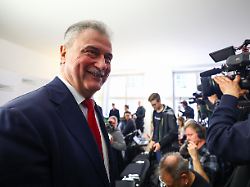Lack of understanding about the rail strike
After “thinking errors” the pressure on Weselsky grows
March 6, 2024, 5:40 p.m
Listen to article
This audio version was artificially generated. More info | Send feedback
The GDL boss actually wanted to speak at a rally in the afternoon. But after Weselsky had to admit that he had made a mistake in his thinking, there was a hail of accusations from all sides that the strike should still take place. Weselsky takes cover and sends his deputy forward.
The head of the train drivers’ union GDL, Claus Weselsky, caused a lack of understanding with the false representation of an interim status in the railway collective bargaining. The President of the Federal Association of Local Rail Transport, Thomas Prechtl, expressed his understanding that misinterpretations could occur after numerous rounds. But it shouldn’t happen “that millions of passengers from Thursday onwards won’t be able to come to work again because of such a mistake in thinking, because trains won’t be running due to the strike.”
The background is Weselsky’s descriptions of a compromise proposal that the former Federal Interior Minister Thomas de Maizière and Schleswig-Holstein’s Prime Minister Daniel Günther submitted as moderators during the weeks of negotiations between the two collective bargaining parties. This envisaged a reduction in weekly working hours in two steps to 36 hours by 2028 with full wage compensation. The railway accepted the proposal. However, the GDL refused. The talks therefore failed last week and the union called for the next strike.
Weselsky presented the mediators’ proposal differently at a press conference on Monday: They had suggested a reduction to just 37 hours with full wage compensation. A further half hour reduction would have been purely optional and associated with financial losses for the employees. In an interview with the “Süddeutsche Zeitung” on Tuesday, Weselsky admitted that he had made a “mistake in thinking” with this false representation. But that doesn’t change his attitude, he added.
Deputy defends tough course
“It is all the more incomprehensible to us that people insist on maximum demands, do not move an inch, stand up and leave the negotiations,” said a railway spokesman in Berlin, referring to the GDL’s rejection. “We were prepared to go beyond our own pain threshold and accept this proposal.” In the collective bargaining dispute, the GDL wants, among other things, to implement a reduction in weekly working hours from 38 to 35 hours for shift workers with full wage compensation – i.e. a reduction of three hours instead of the two hours suggested by the moderators.
Weselsky canceled a planned appearance in front of GDL members in Wuppertal in the afternoon. Instead, his deputy, Mario Reiß, defended the union’s demands. “It is wrong if someone out there says that we are not accommodating to the employer,” said Reiß. The GDL negotiators were prepared to reduce the wage demands from 555 euros more per month to 420 euros per month. The GDL has already reached agreements with 28 other railway companies at this level. The 35-hour week is also anchored there.
However, these collective agreements are subject to conclusion at Deutsche Bahn. If the GDL does not implement the three-hour reduction in working hours there, the contracts already concluded with the competitors will be adjusted again. Weselsky himself spoke of a connection at the beginning of the week. In addition to the train drivers’ union, the Verdi union has also called for warning strikes at Lufthansa this week. With renewed industrial action by several professional groups, Verdi is paralyzing important parts of German air traffic this Thursday. Passengers have to prepare for hundreds of flight cancellations and delays.
Doubts also come from the SPD
The President of the IFO Institute, Clemens Fuest, warned against abuse of power by the unions. “Of course we can’t use this strike at all because it makes the situation worse,” Fuest told the television station “Welt TV”. “The right to strike is important, but it must not be abused. In my opinion, it is actually being used problematically here.”
Clear criticism of Weselsky also came from the Social Democrats: SPD parliamentary group deputy Detlef Müller told the “Tagesspiegel” that there was a proposal on the table that was ready for agreement. “In collective bargaining, no party can achieve 100 percent of their demands.” He added: “It’s about a compromise.” The GDL is harming itself with its tough course, said Müller. “It’s no use if the GDL supports Weselsky’s line but the population rejects it.” The SPD parliamentary group vice-president recommended that the train drivers’ union return to the rules of a regulated collective bargaining agreement.
The chairman of the Bundestag Transport Committee, Udo Schiefner, also called for a return to the negotiating table. “My appeal is very simple: the right to strike is one thing, a sense of responsibility is another,” the SPD politician told the “Bild” newspaper.
